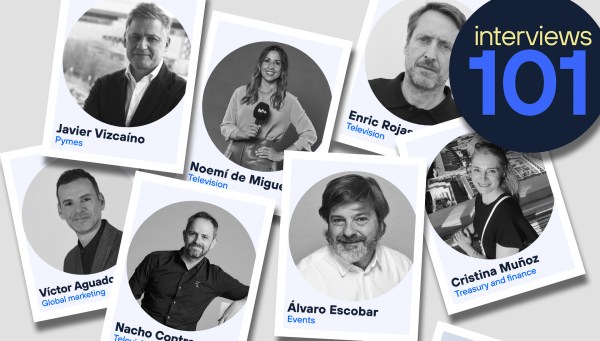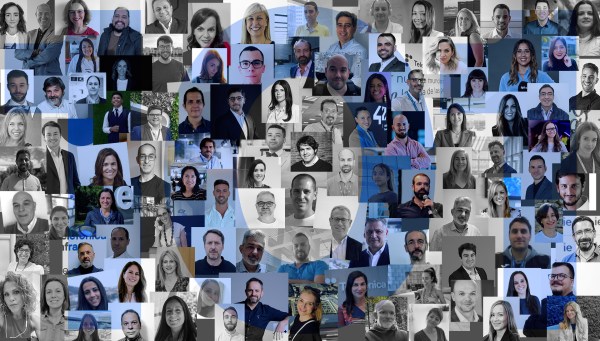Tell us a little about yourself. What does your job at Telefónica involve?
I joined Telefónica in 1999 and am currently Head of Programme Management in the engineering department at Telefónica Digital Innovation.
My professional career began in the world of software development, programming databases. Over time, I discovered the world of software management, work methodologies and process optimisation. This field captured my attention, until I decided to take the plunge and steer my career towards project management. I suppose it was a natural progression, as I have always had a penchant for optimising time, understanding the reasoning behind decisions and finding the most efficient way to achieve objectives.
Throughout my career, I have taken on various challenges, but the role of Programme Manager has undoubtedly been one of the most rewarding. It has given me the opportunity to participate in numerous strategic projects. These projects have allowed me to collaborate with high-level professionals, from whom I have learned a great deal, both technically and personally. This constant collaboration has been a continuous source of growth and motivation.
What does a program manager or programme manager do?
A Program Manager is responsible for overseeing and organising a set of interrelated projects that are managed in a coordinated manner to achieve benefits defined by stakeholders, forming a programme.
The Program Manager’s mission is to ensure the successful planning, execution and delivery of that programme, ensuring that each component is completed on time, in the right way and to the required quality standards. This involves constant coordination with development, product, UX, QA and other stakeholders, promoting the implementation of good management practices and a strong culture of risk identification and mitigation.
But the role goes beyond simply delivering results: it is also about building trust between teams, facilitating collaboration between areas and ensuring that the solutions developed bring real value to the end user.
What are your main responsibilities?
The role of Program Manager involves a series of strategic and operational responsibilities that are fundamental to the evolution and success of technology projects. In our unit, these functions are specified as follows:
- Define the working methodology in a clear, structured and cross-functional manner that allows for the efficient and consistent execution of all projects within a programme.
- Driving continuous improvement by reviewing practices, identifying areas of opportunity and adapting processes to improve efficiency and effectiveness.
- Project planning, including the development of release plans, definition of tentative scopes and management of dependencies between projects.
- Supervising execution, ensuring detailed progress monitoring and making adjustments where necessary.
- Risk management, working proactively with stakeholders to minimise impact, analysing solutions and implementing mitigation plans.
- Facilitate communication between multidisciplinary teams in a fluid and transparent manner with all stakeholders in the product and technology ecosystem.
How can the development of new technologies influence this work?
New technologies are profoundly transforming the way we work, particularly how we manage programmes and projects. Processes that were previously manual, fragmented or difficult to scale have evolved into more agile, integrated and highly collaborative workflows.
These solutions help us manage tasks, delivery schedules and technical dependencies in real time, as well as build advanced timelines that optimally structure resources and deadlines.
However, the impact of technology is not limited to the tools themselves. It also profoundly transforms work culture and dynamics: it promotes asynchronous collaboration between distributed teams, improves progress traceability and enables more agile, data-driven decision-making.
As programme managers, we need to incorporate the use of these technologies as facilitators of change and continuously adapt to the pace of transformation imposed by the current environment.
And AI in particular?
Artificial intelligence is beginning to significantly change the way we do our work. Not only will it automate tasks, but it will also help optimise project management on several fronts, for example:
- Risk prediction. It analyses historical data to identify where problems are most likely to arise, enabling much more proactive risk management.
- Report automation. Intelligent dashboards that automatically generate insights.
- Plan optimisation. Models that can help us optimise release plans and staff allocation across projects.
The key is to understand that AI does not replace us, but rather empowers us. It frees us from repetitive tasks so we can focus on strategy, human relationships and methodological innovation.
What role does innovation play in the professional performance of programme managers?
Innovation is essential to the way we work. We apply innovation not only at the technology level within projects, but also in our methodologies and processes.
This involves:
- Keeping up to date with new methodologies and ways of organising teams.
- Promoting a culture of continuous learning within teams.
- Incorporating emerging tools and practices that improve results.
- Transforming obsolete processes and promoting agility within our organisation through the use of more efficient processes.
As programme managers, we are constantly looking for new ways to improve the quality and efficiency of digital product delivery.
What is the importance of these professional profiles in companies?
Program Managers ensure that the efforts of teams are aligned with the organisation’s objectives, avoiding duplication, bottlenecks and deviations from focus. They bring stability and predictability to environments that are, by nature, highly dynamic. This translates into greater confidence in decision-making, visibility into product progress, and the ability to anticipate risks before they impact results.
In addition, Program Managers foster continuous improvement, promoting the use of methodologies, tools and dynamics that enable software development to scale without compromising quality.
Where there are multiple teams working in parallel, constantly changing technologies and a need for speed, the role of the Programme Manager becomes a differentiating factor for success.
Which people working at Telefónica would you nominate for this interview who you consider to be excellent at their job?
I would nominate Marta Planchuelo and Laura Eguren, two great professionals with whom I have been fortunate enough to work and learn from.







